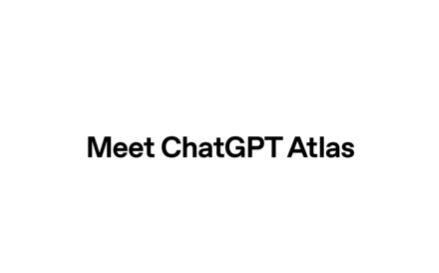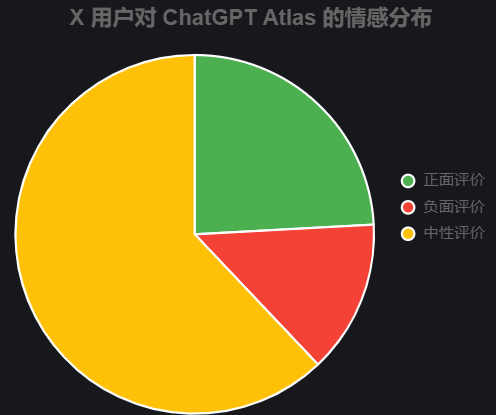As the battle for the AI browser market intensifies, OpenAI has unexpectedly launched a new browser called "ChatGPT Atlas," powered by ChatGPT as its core engine, directly challenging the dominance of Google Chrome. This release coincides with the rumors about Gemini 3, shifting the market's focus instantly. Atlas is available free to all users, while paid users enjoy exclusive multi-step automation in Agent mode, sparking discussions. Based on the latest public information and user feedback, AIbase deeply analyzes this major product, revealing its potential disruptive power.

Atlas Debut: Seamless Integration from Chatting to Browsing
Atlas is not just a simple browser but an AI-powered tool with ChatGPT as its "heart." It is now available globally for macOS, with Windows, iOS, and Android versions coming soon. Users can activate the ChatGPT sidebar on any website without additional plugins, enabling real-time interaction. Unlike traditional address bars, Atlas integrates search and navigation into the chat window, allowing users to access sites simply by inputting URLs or commands in a conversational way. This simplifies operations and allows OpenAI to directly collect browsing data for optimizing AI models (users can choose to disable it).

Early testing shows that Atlas is based on the Chromium engine, compatible with Chrome extensions, but currently does not support some plugin installations. The interface is clean and modern, with users reporting that it makes other browsers seem outdated. Free users can experience core features like web summaries and content analysis, while paid users (Plus/Pro) unlock more advanced permissions.
Smart Web Interaction: Questions, Suggestions, and Tab Management All in One
The core selling point of Atlas lies in its multimodal web support. Users can directly ask questions about web pages, such as "summarize the key data of this report" or "compare these product prices," and ChatGPT will analyze and generate tables or suggestions in real time. As users type, the AI provides real-time completion suggestions, avoiding interruptions. More practically, tab control: AI suggests opening/closing tabs based on context, reducing the pain point of "tab chaos."
This design significantly enhances productivity. Imagine browsing an e-commerce page where Atlas automatically recommends similar products, or on a news site where it extracts trend summaries. Compared to Perplexity's Comet or Opera's Neon, Atlas focuses more on deep integration with ChatGPT, avoiding fragmented functionality.
Agent Mode Revealed: Cross-Page Automation, Ordering an iPad Pro with One Click
Agent mode, a premium feature for paid users, is considered Atlas's "killer feature." This experimental function turns ChatGPT into a virtual agent capable of performing multi-step web tasks, such as navigating logins, filling out forms, or cross-page operations. In a demonstration, the AI was instructed to "order the latest Apple device," and it quickly selected the iPad Pro M4. Detecting the pre-sale status without a shopping cart button, it switched to the iPhone 17 Pro and completed the addition process smoothly. The entire process was seamless, taking only a few minutes.
User tests show that Agent mode performs well in shopping, booking, and research scenarios, such as automatically loading recipe ingredients into a shopping cart or analyzing health data to generate reports. It supports "viewing mode" (real-time monitoring by users) and a "stop button" to ensure safety. OpenAI emphasizes that this mode is limited to paid users for preview purposes, aiming to collect feedback for iteration.
Browser Memory: The "Invisible Driver" of Personalized Experience
By searching on X (Twitter), the majority of online posts are news reprints and initial experience shares (within 24 hours of the release, discussion volume is limited, about 30 related posts). Overall sentiment is neutral (news reporting), with positive reviews focusing on convenience and innovation potential, while negative ones involve privacy risks, platform compatibility, and lack of extension support. Here are the key data statistics: Sentiment distribution statistics use simple keyword analysis (positive words like "convenient", "innovative", "excited"; negative words like "privacy concern", "no support", "slow"), categorizing 29 posts:
- Positive: 7 posts (24%) — users appreciate the convenience of integrating AI, the automation of the agent mode, and the ecological potential.
- Negative: 4 posts (14%) — concerns about privacy, security vulnerabilities, no support for Intel Macs, and no Chrome extensions.
- Neutral: 18 posts (62%) — pure news sharing or balanced pros/cons lists.

Typical user evaluation examples are listed below in a table, excerpting some representative posts (translated into Chinese for easier reading), covering diverse opinions:
| Type | User | Key Content (Excerpt) | Link/ID |
|---|---|---|---|
| Positive | @surasb11 | "ChatGPT keeps providing help, but I want to play the new mouse tracking feature" | [post:38] [Post:38] |
| Positive | @liruifengv | "OpenAI is focusing on the surrounding ecosystem, Atlas supports sidebar chat and Agent mode operations on web pages" (praising the strategy and functions) | [post:39] [Post:39] |
| Positive | @ainutpam | "Similar to Perplexity's Comet, but from OpenAI, global agents can perform browser actions" (positive comparison) | [post:42] [Post:42] |
| Positive | @JakeLindsay | "Atlas could disrupt web browsing, supporting autonomous clicks/inputs, importing bookmark history; overall prospects are promising but need caution" (balanced but slightly positive) | [post:43] [Post:43] |
| Positive | @chanMAX_35 | "Higher completion than existing AI browsers, o3/GPT-5 search capabilities are overwhelming" (high performance evaluation) | [post:47] [Post:47] |
| Positive | @nyanco_pass | "Let Atlas ask Grok the weather, it checked it itself and boasted 'I'm better'! AI is growing" | [post:51] [Post:51] |
| Positive | @FERE_Press | "The sidebar is always by your side, which is very convenient, and linking other apps is easy" | [post:54] [Post:54] |
| Negative | @DIYgod | "Excitedly installed, but it can't use browser extensions, first make it a basic browser, please Google teach it" | [post:48] [Post:48] |
| Negative | @dysoftwave | "An Intel CPU Mac doesn't support it, wait for other platform versions" | [post:56] [Post:56] |
| Negative | @seo_mintavocado | "SEO note: Atlas search doesn't cite any sources. OUCH." | [post:57] [Post:57] |
| Negative | @8kpx | "Trying to play browser games, there are time/number limits, after a few hands of 2048 it stops" | [post:62] [Post:62] |
| Neutral | @BobMute2 | "Pros of Atlas: integrated assistant, automated tasks; cons: privacy risks, agent reliability" (detailed pros/cons list) | [post:45] [Post:45] |
| Neutral | @levix_dev | "Built-in ChatGPT, supports memory history and agent improvements, currently released globally for macOS" | [post:59] [Post:59] |
| Neutral | @blognone | "OpenAI launches ChatGPT Atlas, an AI browser simplifying ChatGPT usage" | [post:60] [Post:60] |
| Neutral | @aryarya | "OpenAI announces the browser ChatGPT Atlas, supporting asking AI while browsing" | [post:61] [Post:61] |
| Neutral | @madonomori | "ChatGPT Atlas is released, a new concept chat AI browser, free but only for Mac" | [post:66] [Post:66] |
| Neutral | @The_reverse_ai | "Besides Atlas and Google AI, I'm not interested in others, too many AIs" | [post:67] [Post:67] |
Overall Insights
- Clear Advantages: Users appreciate the seamless AI integration (such as sidebar summaries, agent automation), seeing it as a "browse revolution," especially suitable for research/shopping scenarios.
- Obvious Pain Points: Privacy/security concerns are common (e.g., data usage of memory functions), compatibility (only Apple Silicon Mac) and lack of extensions are early issues; SEO practitioners worry about traffic impact.
- Future Expectations: Posts mostly expect cross-platform releases and improved stability. Currently, discussions are mainly by Asian users (Japanese/Chinese/Thai), while English-speaking communities have more balanced pros/cons.
- Data Source: X keyword search ("ChatGPT Atlas" OR "Atlas browser" since:2025-10-21), combined with semantic analysis. As time goes on, evaluations will become richer. If updates or specific dimensions (like Agent mode) are needed, further queries can be made.
Market Impact: Google Sounds the Alarm, Accelerating the AI Browser Era
After the release of Atlas, Google's stock price dropped immediately by 4%, highlighting the market's concern over Chrome's dominance. OpenAI CEO Sam Altman said this move is a "once-in-a-decade opportunity to reshape the browser." Under the wave of AI search, Atlas includes traditional search (web, images, videos), seen as a "drunkard's intention" to capture Google's share. Competitors like Brave and Dia have similar attempts, but Atlas's combination of Agent and memory is more forward-looking.
AIbase's opinion: Atlas marks the transformation of browsers from "passive tools" to "active assistants," especially the Agent mode indicating the commercial explosion of agent AI. With a low free threshold, it will attract a massive user base, but privacy and security remain challenges. If you're hesitant about Chrome, it's recommended to download the macOS version for trial—this might be the next standard for internet access.









